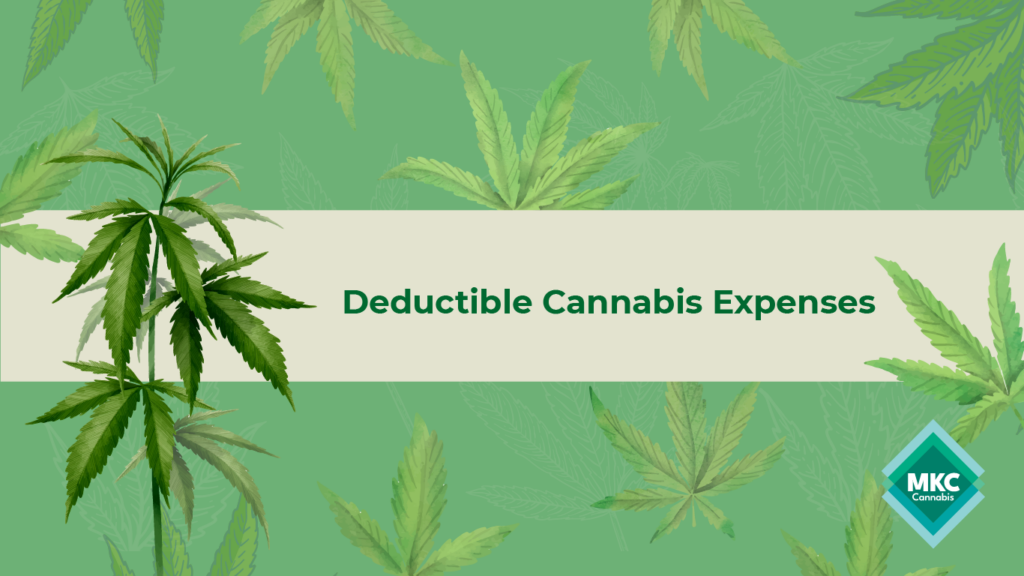Legal cannabis sales are growing exponentially, especially as more and more states move towards legalizing weed. This growth means store owners going the legal route must quickly come to terms with accounting and taxing for their businesses in a field that has not completely figured itself out yet. However, the IRS will still come for that taxable income, and cannabis or cannabis product owners need to be prepared for this.
What Is The Problem With Paying Taxes as a Cannabis Operator?
Due to the grey area that most cannabis productions still operate in, there is no real support from national banking institutions. Because of this lack of federal aid, most cannabis operations are forced to run cash-only businesses or turn to smaller state-chartered banks and credit unions. However, forming these critical business relationships is often challenging, with multiple hurdles for both sides. Another challenge comes in the form of IRS Tax Code 280E. This code does not allow any deduction or credit for running a business trafficking a controlled substance. Even if cannabis sales are legal in the state, it still is illegal federally and cannot be managed like typical taxes.
When it comes to current times, state-legal businesses want to create law-compliant operations. Still, they are burdened with paying taxes for regular business expenses under a law that considers most of their costs illegal. There is some good news, however! Cannabis cultivators may have an easier time with taxes than cannabis retailers since it has more to do with growing a product than selling or trafficking it. Unfortunately, no matter what part of the cannabis industry someone is in, they still have to pay a tax rate nearly 3.5 times higher than other businesses. This higher rate is primarily due to not being allowed to deduct employee salaries, cost of technology, accounting, rent, etc. But luckily for most owners, there are exceptions to get around IRS Tax Code 280E.
What Can, and Cannot, Be Deducted From A Business Tax Return?
It is pretty simple to determine what you can deduct from a business tax return as a cannabis operator. Cultivators and sellers can deduct the Cost of Goods, or COG’s, including all costs or expenses related to the production of the good itself. A list of COGs includes :
- Invoice prices for the cost of the cannabis product
- Electric bills relating to the growing, packing, or inventory areas
- Any statements associated with transportation such as legal shipping costs or cost of travel to purchase cannabis
- The cost of raw materials and supplies, including seeds and fertilizer
- Indirect product costs like equipment maintenance, utilities used during the growing process, quality control, and inspections.
Additionally, please note what state you are in! Some states, such as Colorado and Oregon, exclude the 280E tax code when calculating state income tax, meaning licensed businesses can deduct all ordinary business expenses rather than the limited list above.
In turn, there are many aspects of the cannabis industry that cannot be deducted from taxes. These include :
- Rent for a business or storefront
- Utility costs for storefronts
- Product display cases
- Employee salaries
- Insurance
- Professional or licensing fees
- Other business expenses that are not listed above
Tax Code 280E Application By State
Alabama: 280E Applies. Alabama imposes a Controlled Substances Tax. See Ala. Code Sec. 40-17A-1 through Ala. Code Sec. 40-17A-16. Dealers must pay the tax if they possess, distribute, sell, transport, import, transfer or otherwise use any marihuana
Alaska: Alaska corporate income tax is Federal taxable income with no provision stating Section 280E does not apply.
Arizona: Arizona corporate income tax is Federal taxable income reported on line 30 with no provision stating Section 280E does not apply.
Arkansas: Arizona has no reference to 280E or similar state provisions.
California: California’s corporation tax law does not conform to the Internal Revenue Code, meaning the automatic denial of deductions under IRC Section 280E do not apply
Colorado: Colorado specifically allows corporations to subtract expenses disallowed by Section 280E to determine Colorado taxable income. See Colo. Rev. Stat. § 39-22- 304(3)(m), (n).
Connecticut: Connecticut corporate income tax starts with Federal taxable income as reported on line 28, and there are no provisions that state Section 280E does not apply.
Delaware: Delaware corporate income tax starts with Federal taxable income as reported on line 28, and there are no provisions that state Section 280E does not apply.
D.C.: D.C. corporate income tax starts with Federal taxable income as reported, and there are no provisions that state Section 280E does not apply.
Florida: Florida corporate income tax starts with Federal taxable income as reported, and there are no provisions that state Section 280E does not apply.
Georgia: No Information
Hawaii: Act 230, SLH 2016 (Act 230) allows taxpayers in medical marijuana businesses to deduct business expenses and claim tax credits on their income taxes. Act 230 is effective for taxable years beginning after December 31, 2015. See Haw. Rev. Stat. § 235-2.4(r). Applicable to tax years beginning after December 31, 2015, Section 280E does not apply to the production and sale of medical marijuana and manufactured marijuana products by dispensaries licensed under Chapter 329D and their subcontractors. See Haw. Rev. Stat. § 235-2.4(r).
Idaho: No Information
Illinois: Illinois conforms to the Internal Revenue Code, and the starting point is Federal Adjusted Gross Income. There is no provision that states Section 280E does not apply.
Indiana: No information
Iowa: Yes. Iowa conforms to the Internal Revenue Code, and the starting point is Federal taxable income. There is no provision that states Section 280E does not apply.
Kansas: No information
Kentucky: No information
Louisiana: Louisiana generally conforms to the Internal Revenue Code, and the starting point is Federal taxable income after adjustments and the deduction for Federal income taxes paid. There is no provision that states Section 280E does not apply.
Maine: In Maine, Section 280E does apply, and the state conforms to the Internal Revenue Code, with the starting point being the Federal Adjusted Gross Income. Currently, there is no provision that conditions Section 280E do not apply. However, the legislature has considered enacting a provision that would allow deductions otherwise disallowed by Section 280.
Maryland: Maryland conforms to the Internal Revenue Code, and the starting point is Federal Taxable Income. There is no provision that states Section 280E does not apply.
Massachusetts: Massachusetts conforms to the Internal Revenue Code, and the starting point is Federal taxable income. There is no provision that states Section 280E does not apply.
Michigan: Michigan conforms to the Internal Revenue Code, and the starting point is Federal taxable income. There is no provision that states Section 280E does not apply.
Minnesota: Yes. Minnesota conforms to the Internal Revenue Code, and the starting point is Federal taxable income. There is no provision that states Section 280E does not apply.
Mississippi: No information
Missouri: No information
Montana: Montana conforms to the Internal Revenue Code, and the starting point is Federal taxable income. There is no provision that states Section 280E does not apply.
Nevada: No information
New Hampshire: New Hampshire conforms to the Internal Revenue Code, and the starting point is Federal taxable income. There is no provision that states Section 280E does not apply.
New Jersey: New Hampshire confirms the Internal Revenue Code, and the starting point is Federal taxable income. There is no provision that states Section 280E does not apply.
New Mexico: New Mexico confirms the Internal Revenue Code, and the starting point is Federal taxable income. There is no provision that states Section 280E does not apply.
New York: New York conforms to the Internal Revenue Code, and the starting point is Federal taxable income. There is no provision that states Section 280E does not apply.
North Carolina: No information
North Dakota: North Dakota conforms to the Internal Revenue Code, and the starting point is Federal taxable income. There is no provision that states Section 280E does not apply. However, lawmakers are considering a condition that would render Section 280E inapplicable. See House Bill No. 1430, Section 19-24-19.
Ohio: No information
Oklahoma: No information
Oregon: Oregon has enacted a provision that allows corporate taxpayers to subtract expenses for any federal deduction that a taxpayer would have been allowed if not for Section 280E to determine state taxable income. See ORS § 317.763.
Pennsylvania: Pennsylvania conforms to the Internal Revenue Code, and the starting point is Federal taxable income. There is no provision that states Section 280E does not apply.
Rhode Island: RI conforms to the Internal Revenue Code, and the starting point is Federal taxable income. There is no provision that states Section 280E does not apply.
South Carolina: No information
South Dakota: No information
Tennessee: No information
Texas: No information
Utah: No information
Vermont: Vermont conforms to the Internal Revenue Code, and the starting point is Federal taxable income. There is no provision that states Section 280E does not apply.
Virginia: No information
Washington: No information
West Virginia: WV conforms to the Internal Revenue Code, and the starting point is Federal taxable income. There is no provision that states Section 280E does not apply.
Wisconsin: No information
Wyoming: No information
In the end, cannabis owners should be as meticulous in their record-keeping as is possible. A growing number of cannabis businesses are creating corporate structures to limit their liability as business owners, which also helps deal with tax liabilities. Make sure to consult your attorney to determine what deductions can and cannot be made on their tax returns and what other ways you can maximize the income of your marijuana business.
Book a consultation to get started on a vibrant campaign that not only meets but exceeds your state and market requirements—not to mention converts customers for better revenue, social footprint, and company growth.








